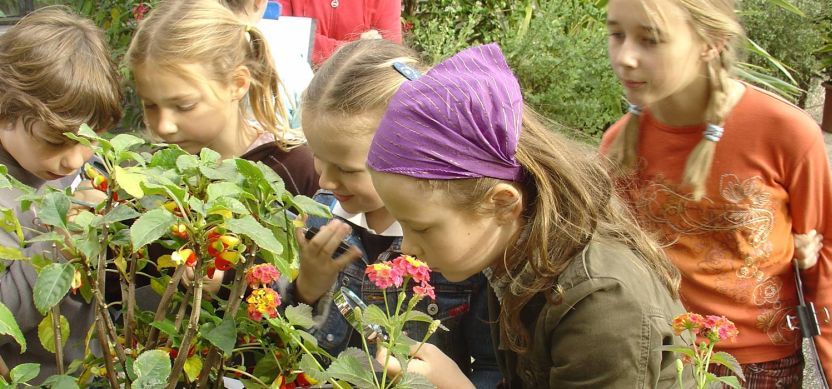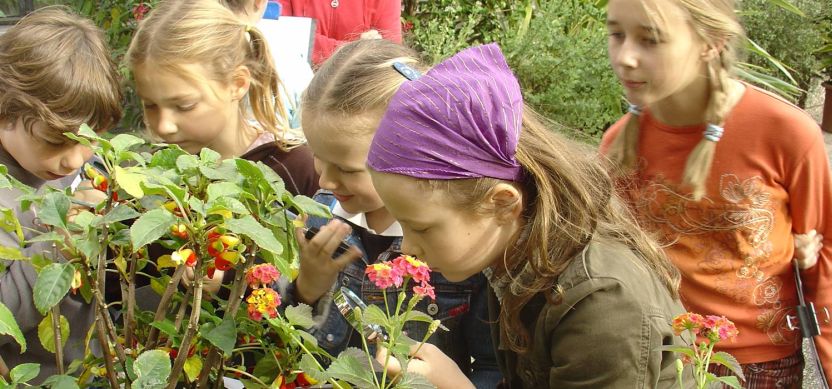INQUIRE Project

-
Status of project
Completed -
Region
Global -
Topic
Public Engagement
INQUIRE Project
Project: Completed
Funded by European Union
Project Partner: Innsbruck University Botanic Garden
About
INQUIRE project, a European Union funded project which aimed to reinvigorate inquiry-based science education (IBSE) in formal and informal education systems (specifically Learning Outside the Classroom sites) throughout Europe but developing and running teacher training courses demonstrating how IBSE can inspire students in science and help address biodiversity and climate change.
The project was coordinated by Innsbruck University Botanic Garden with support from BGCI, INQUIRE involved 17 partners in 11 countries. Over the 5 year project training courses for Learning Outside the Classroom educators in inquiry-based learning methods, research methodology and assessment techniques were developed as well as a series of Train the Trainer courses to ensure the sustainability of the project beyond the end of the funding.
The INQUIRE objectives of INQUIRE were:
- To introduce IBSE in formal and informal settings on a large scale
- To snowball best practice pedagogical approaches through practitioner training
- To establish a key network of educators, teachers, teacher trainers and researchers for the revival of IBSE
- To offer front-line support to teachers and informal educators to practice IBSE
- To use IBSE to engage young people in a scientific discourse about biodiversity conservation and climate change
- To bridge the gap between educational researchers and practitioners
- To support the development of European wide standards for evaluating formal and informal education programmes
- To make the case for inquiry and context based learning
- To examine the implementation of curriculum based innovations
- To stimulate and motivate science learning from the earliest stage
- To increase self-confidence in girls to study science
What is Inquiry-Based Science Education (IBSE)?
Designed to reflect how students actually learn, IBSE also engages them in the process of scientific inquiry. Increasingly it is seen as key to developing their scientific literacy, enhancing their understanding of scientific concepts and heightening their appreciation of how science works.
Whereas traditional teaching methods have failed to engage many students, especially in developed countries, IBSE offers outstanding opportunities for effective and enjoyable teaching and learning. It provides stimulating environments for students to explore their learning in authentic situations.
Knowledge is built through testing ideas, discussion with teachers and peers, and direct interaction with scientific phenomena. In fostering a practical, hands-on approach, IBSE can lead to a ‘minds-on’ comprehension of scientific concepts.
Results
Between 5th September 2011 and 19th October 2012, the partners ran 13 pilot INQUIRE courses. These courses where attended by, a total of 250 participants from various professional backgrounds. Following the success of this, between September, 2012 and October, 2013, 15 INQUIRE courses were run. These courses were attended by, a total of 326 participants. This was supported by the mentoring, promotion and global dissemination, aided by the Community of Practice which was established.
The subject content of the courses focused on the major global issues of the 21st Century: biodiversity loss and climate change. Botanic gardens and other LOtC institutions are wonderful learning sites for children and adults alike. Engaging these sites in offering teacher training courses in IBSE techniques has proved an effective way to motivate teachers to implement inquiry learning in classrooms, with the majority of the partners continuing to use the skills gained during the project and many continuing to offer the courses.
INQUIRE resources
-
Inquiry-Based Science Education Resources
Public Engagement / Publication / English
